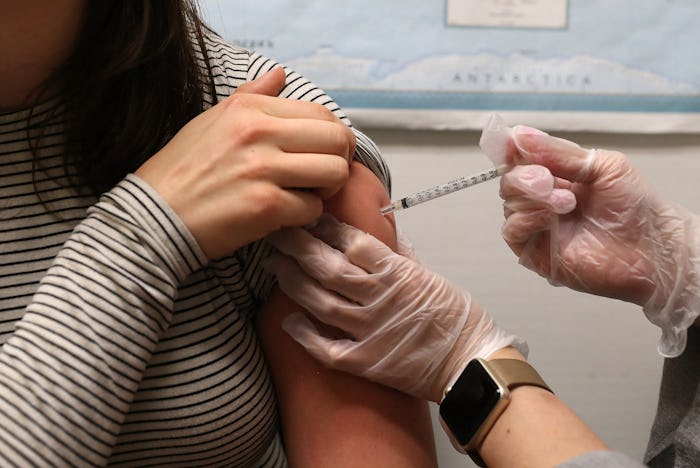Life

If You Have A Cold RN, Here's When You Should Get Your Flu Shot
Flu season is upon us, and if you haven't already gotten your flu shot, it's time to sign up for one. But what happens if you're in the midst of a nasty cold spell? Can you get the flu shot if you have a cold? In most cases, you should wait, particularly if you have a fever and your cold is moderate to severe. Dr. Sabina Rebis, family physician and founder of The Model of Health, weighed in with her thoughts in an email interview with Romper.
"If you have a cold, you should wait to get the flu shot," she says. "It's a dead virus, so it won't harm you. However, since your immune system is revved up already fighting another infection, it will probably fight off the small amount of antigen in the flu shot at a faster rate and the amount of antibodies (protection) created against the flu virus will not be large enough to fight the flu once exposed to it. Also, If you’re already not feeling well, introducing a second viral challenge in the form of a flu shot may also leave you feeling even more under the weather. We do recommend that you wait until you’ve battled the cold symptoms and are feeling better before you get your flu shot for it to have the best effect in protecting you from the flu."
As far as how long you should wait after you've begun to feel better, Rebis suggests, "Usually it’s best to wait until you no longer have a fever (your body temp is under 100.4 degrees) and after at least five days of symptoms when you have a cold." So there you have it. Unless it's just a light sniffle or two, wait until you're better to get your flu shot. And don't forget, OK?
According to the CDC, while the vaccine does not offer 100% protection from the flu, it is still the first and best way to protect yourself from getting sick. Not only does it reduce your likelihood of catching the bug, it also lessens the chance of developing life-threatening side effects of the flu if you do get sick. Additionally, the more people who get vaccinated, the lower the chances of the virus spreading to vulnerable people on opposite ends of the age spectrum: the elderly and babies, who could be in serious trouble if they get the flu. Washing your hands regularly is great, but it's simply not enough.
In a recent press release from St. Jude Children's Research Hospital, Dr. Richard Webby, a member of the Infectious Diseases Department and the World Health Organization's Vaccine Composition Team, wrote, "This year’s flu vaccine has been reformulated and updated based on last year’s flu season. Although it’s too early in the United States to make predictions, parts of the Southern Hemisphere, where flu season is winding down, had relatively active flu activity. Without an ability to accurately predict the severity of the upcoming season in the United States, it is imperative that all people get a flu short or nasal mist for equal amounts of protection."
As stated above, Webby concludes, "The flu shot is a valuable and life-saving public health tool. Getting the flu vaccine isn’t just about protecting your health, it’s also about protecting those around you who are vulnerable, like the elderly, children, and those with serious health issues. The more people who get the flu shot, the less chance the virus can spread while protecting more people."
If you are not insured and concerned about where you can get a flu shot, have no fear. There are plenty of places where you can find a free flu shot. Stay healthy, friends.
Experts:
Dr. Sabina Rebis, family physician and founder of The Model of Health
This article was originally published on